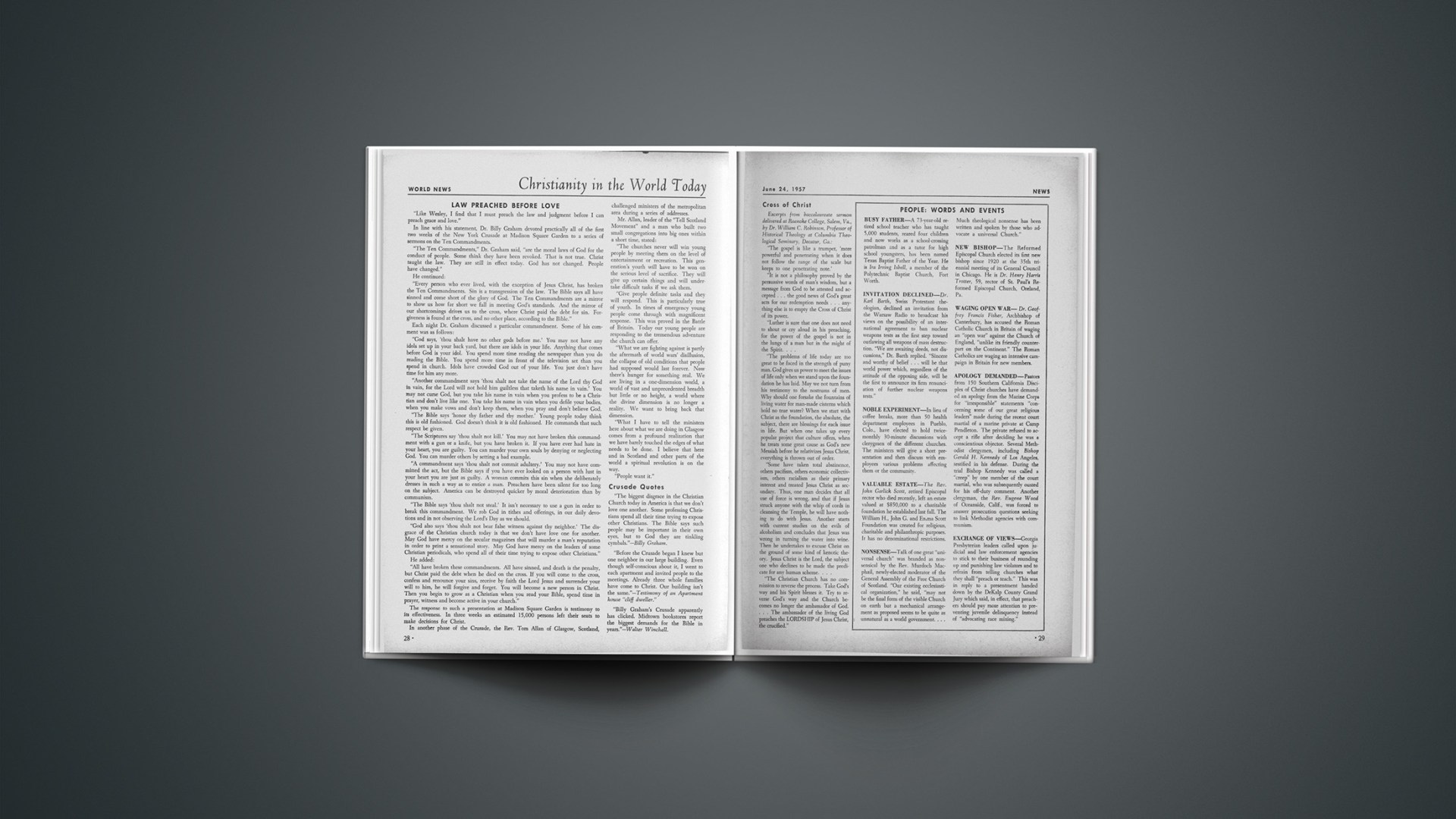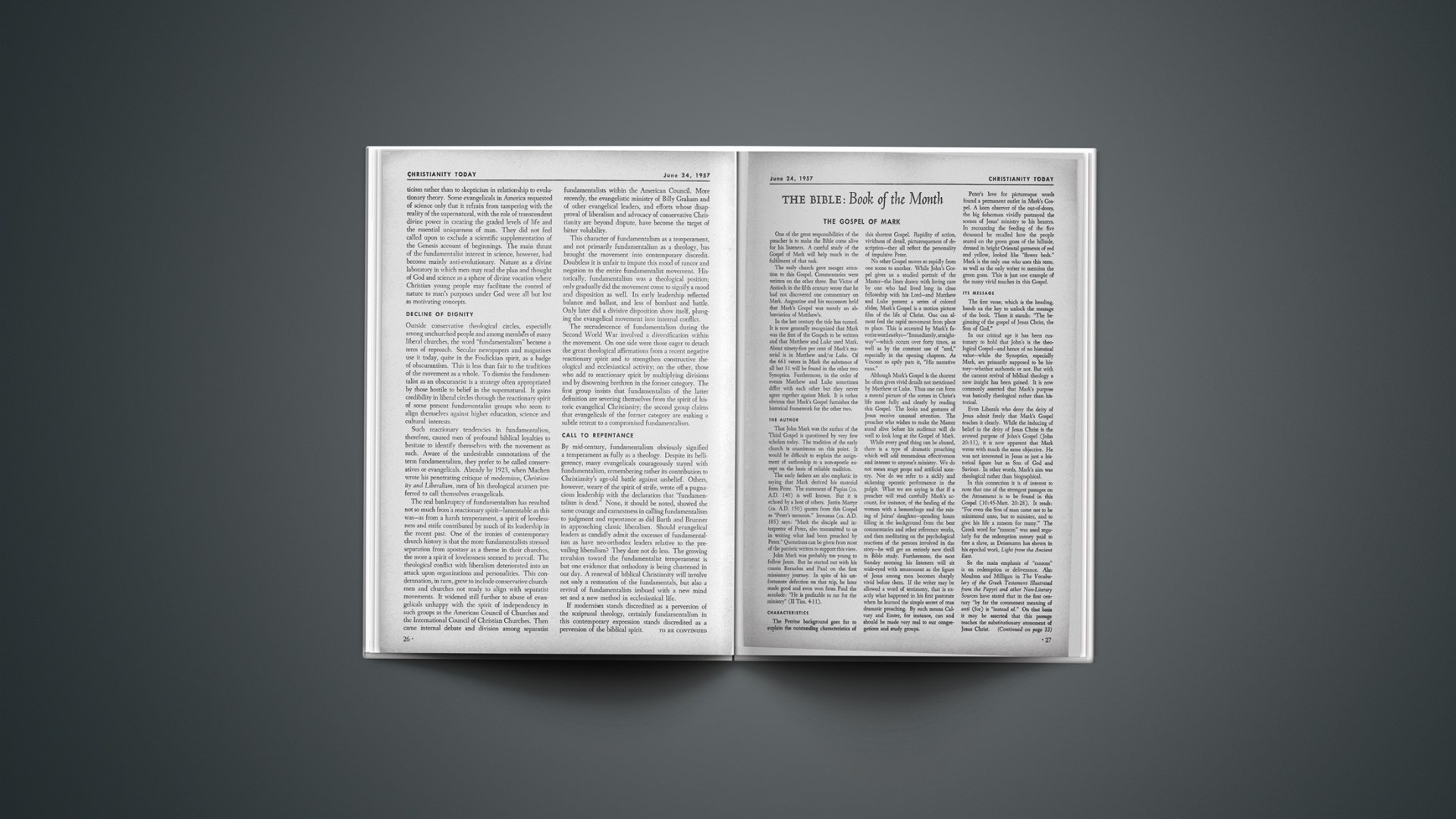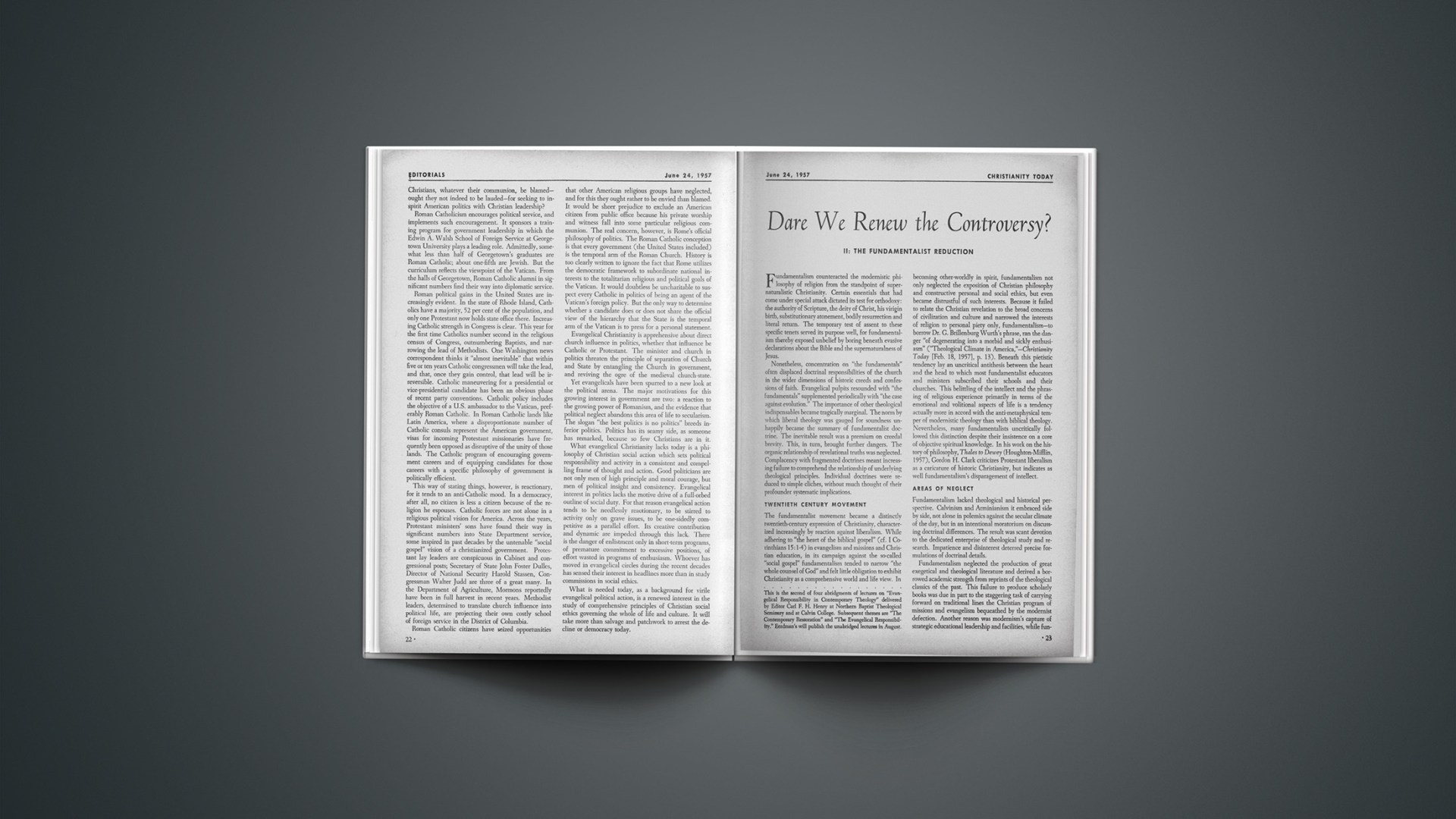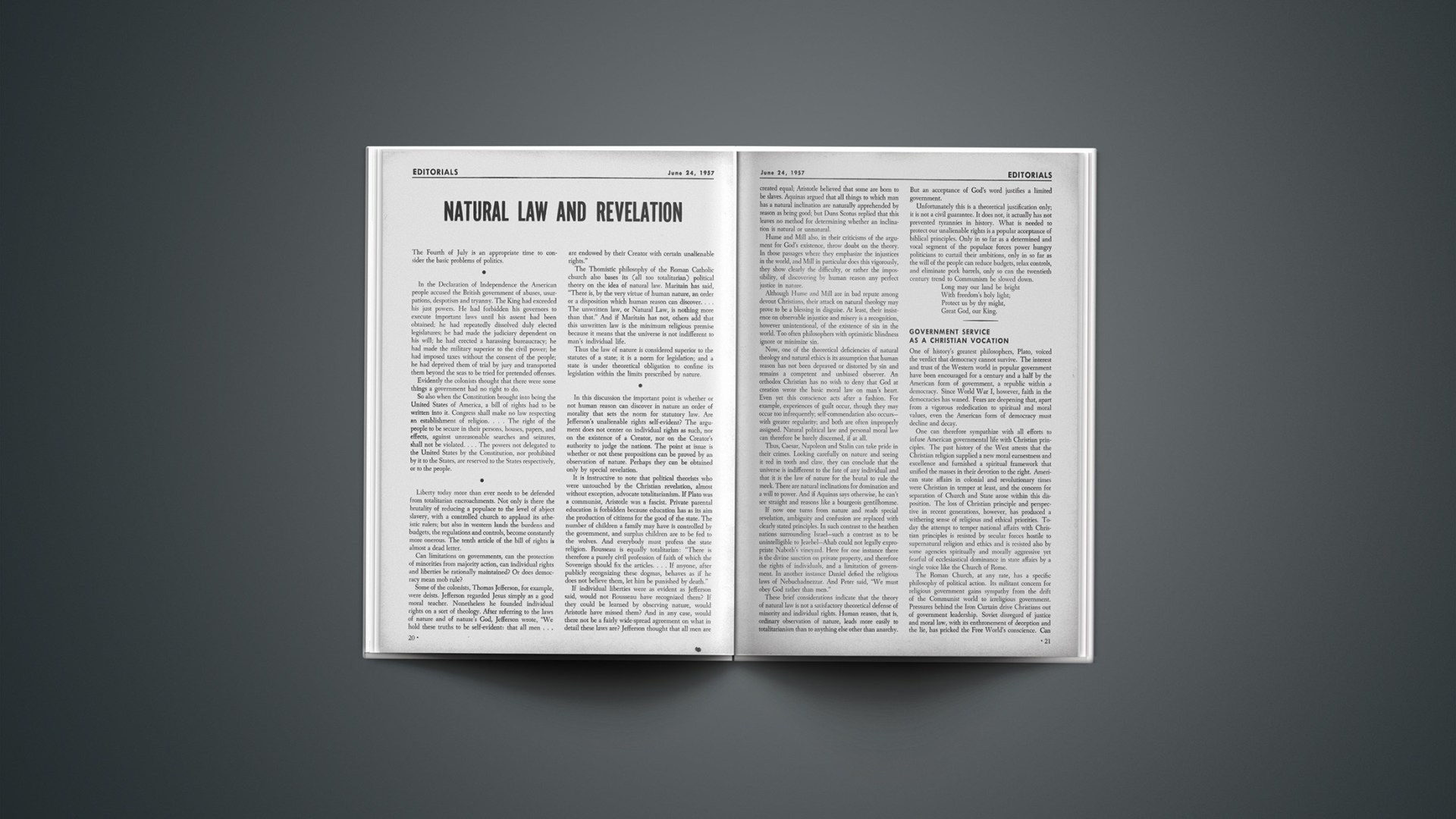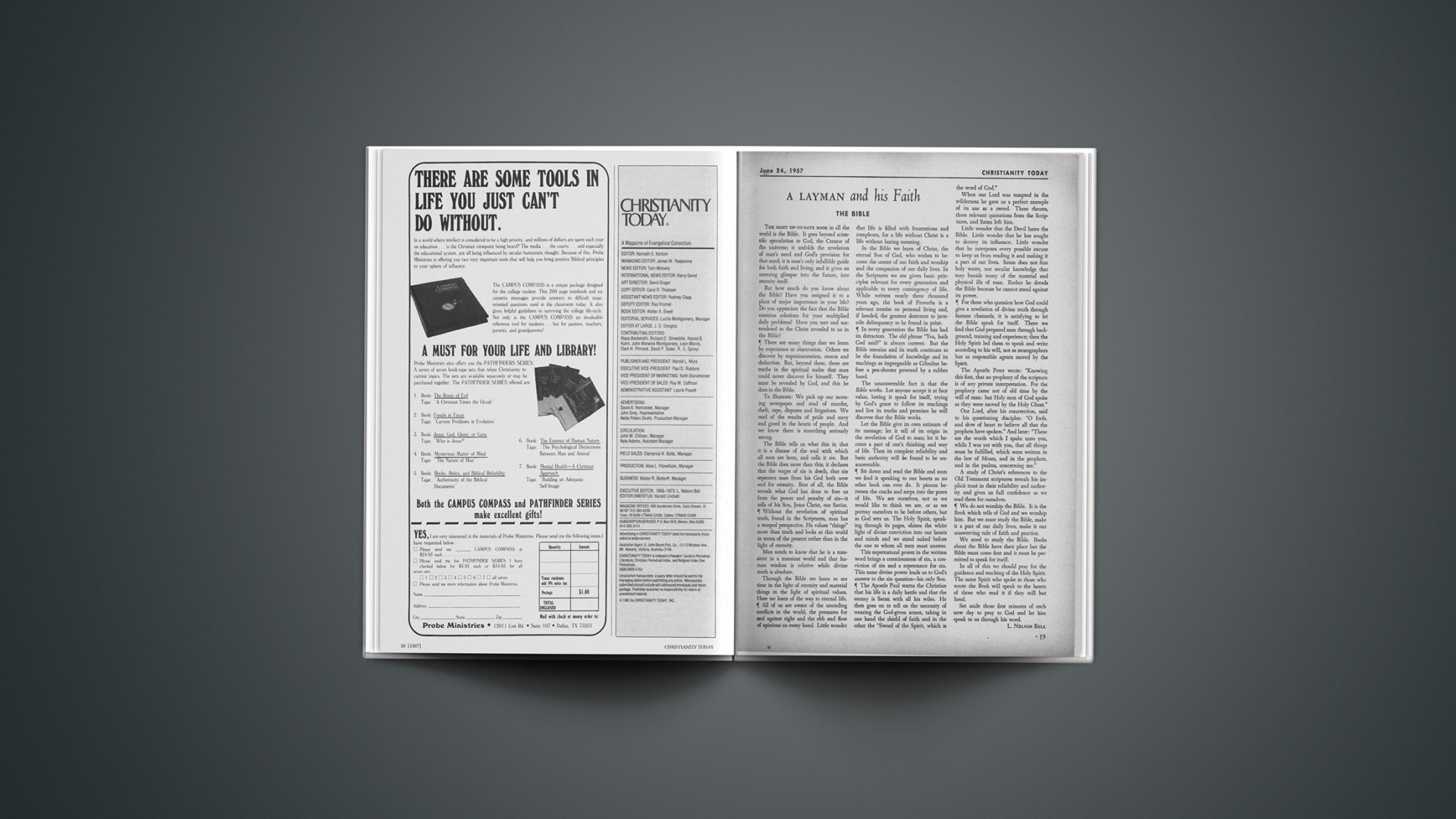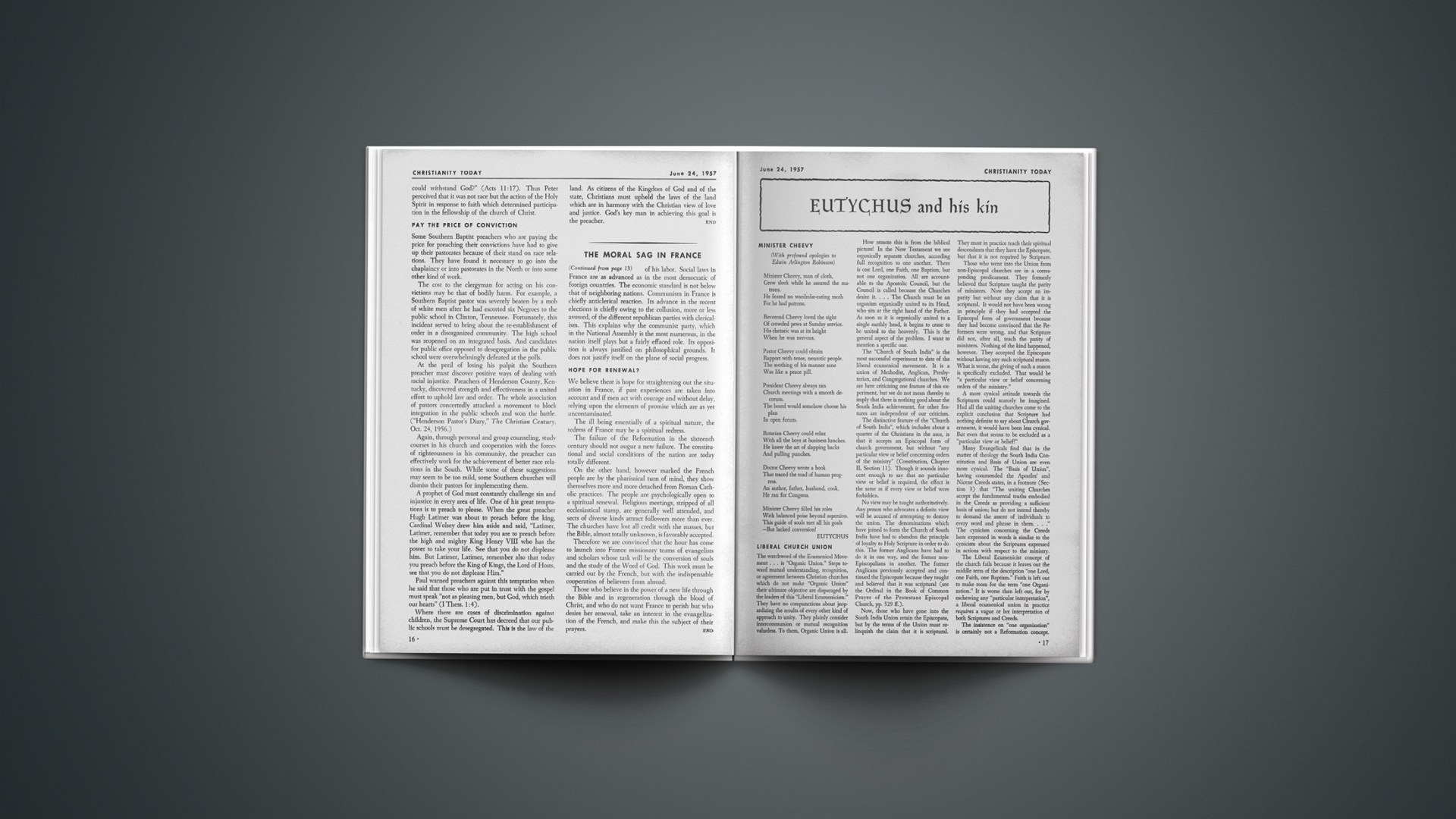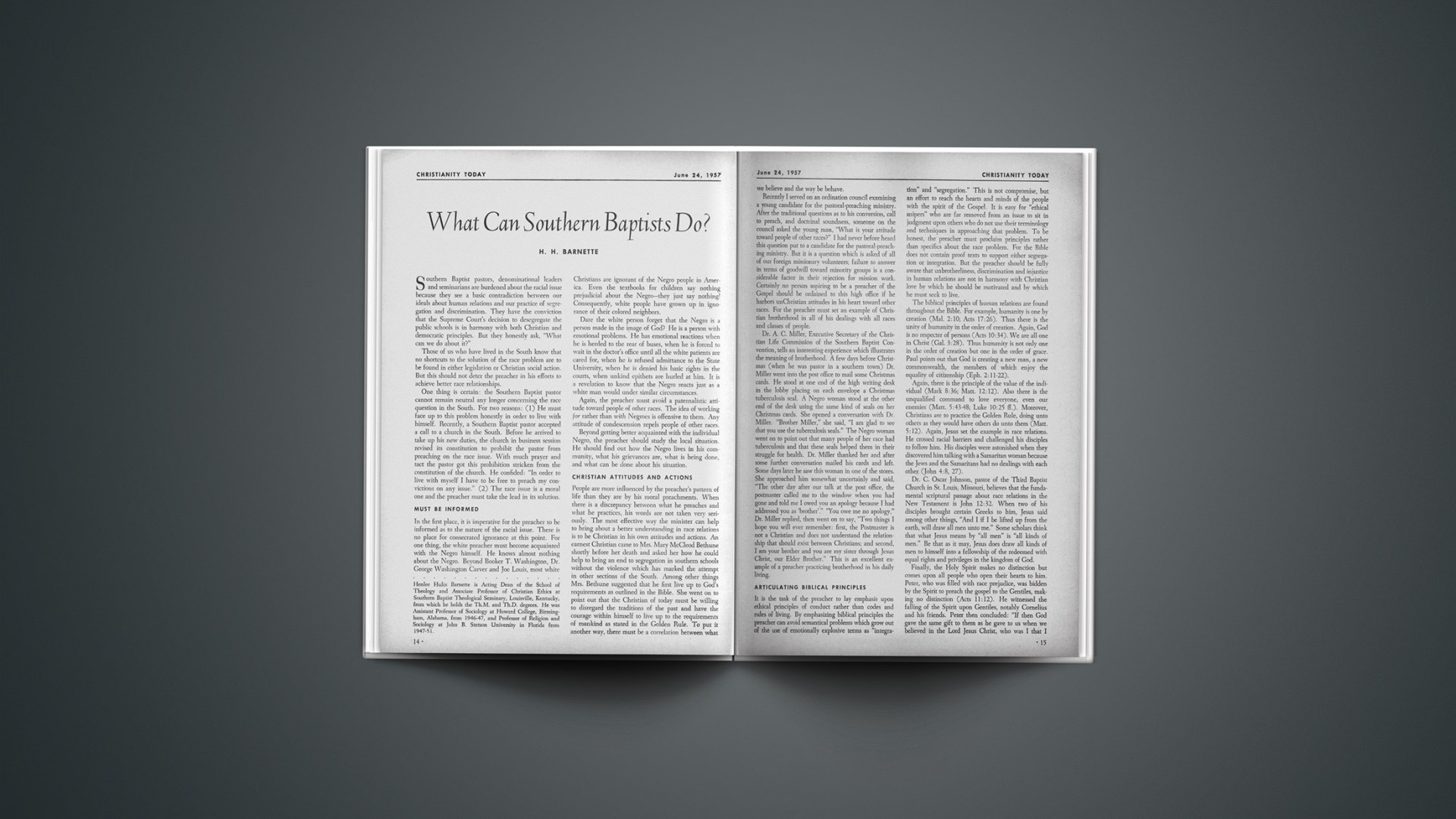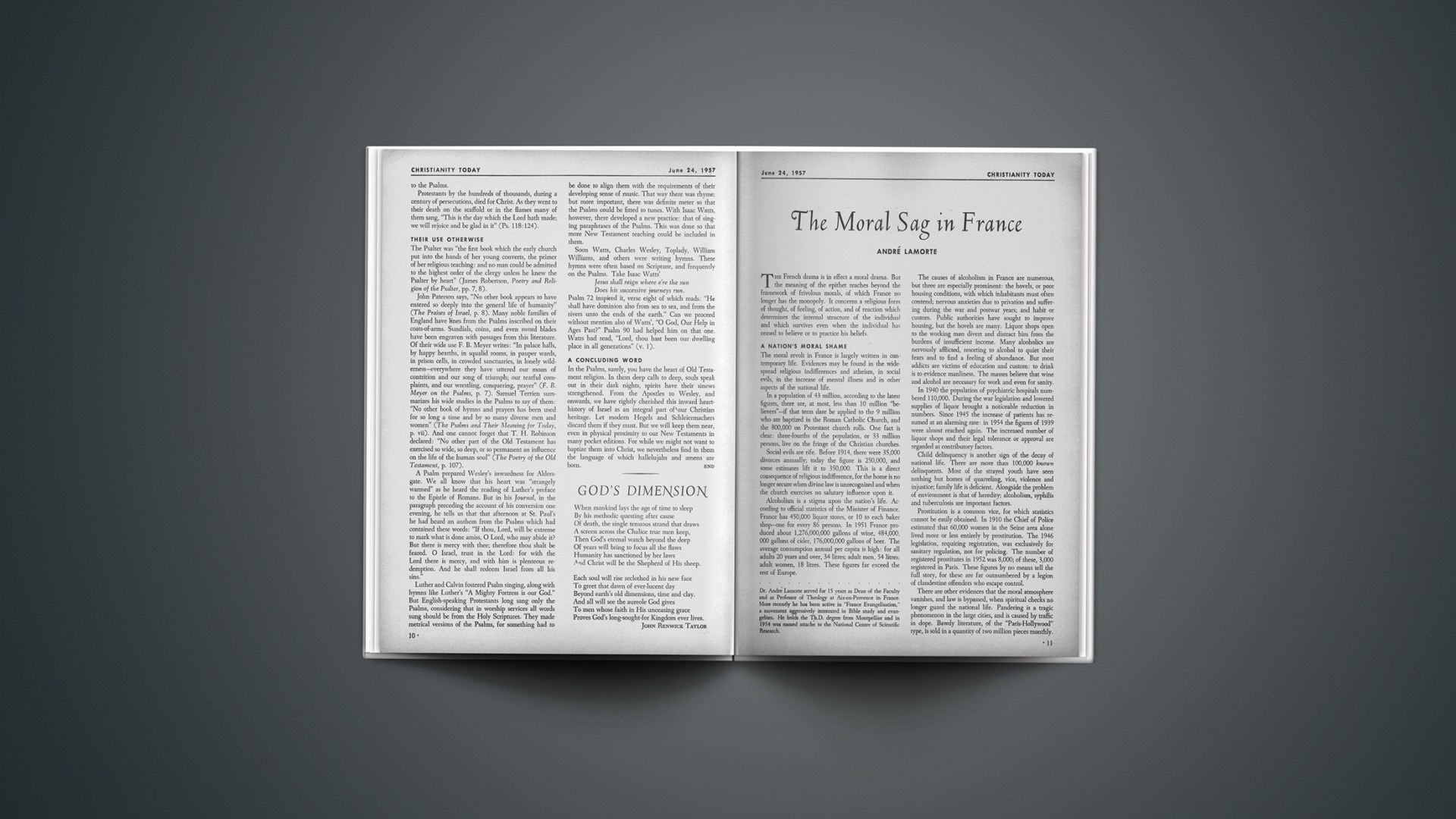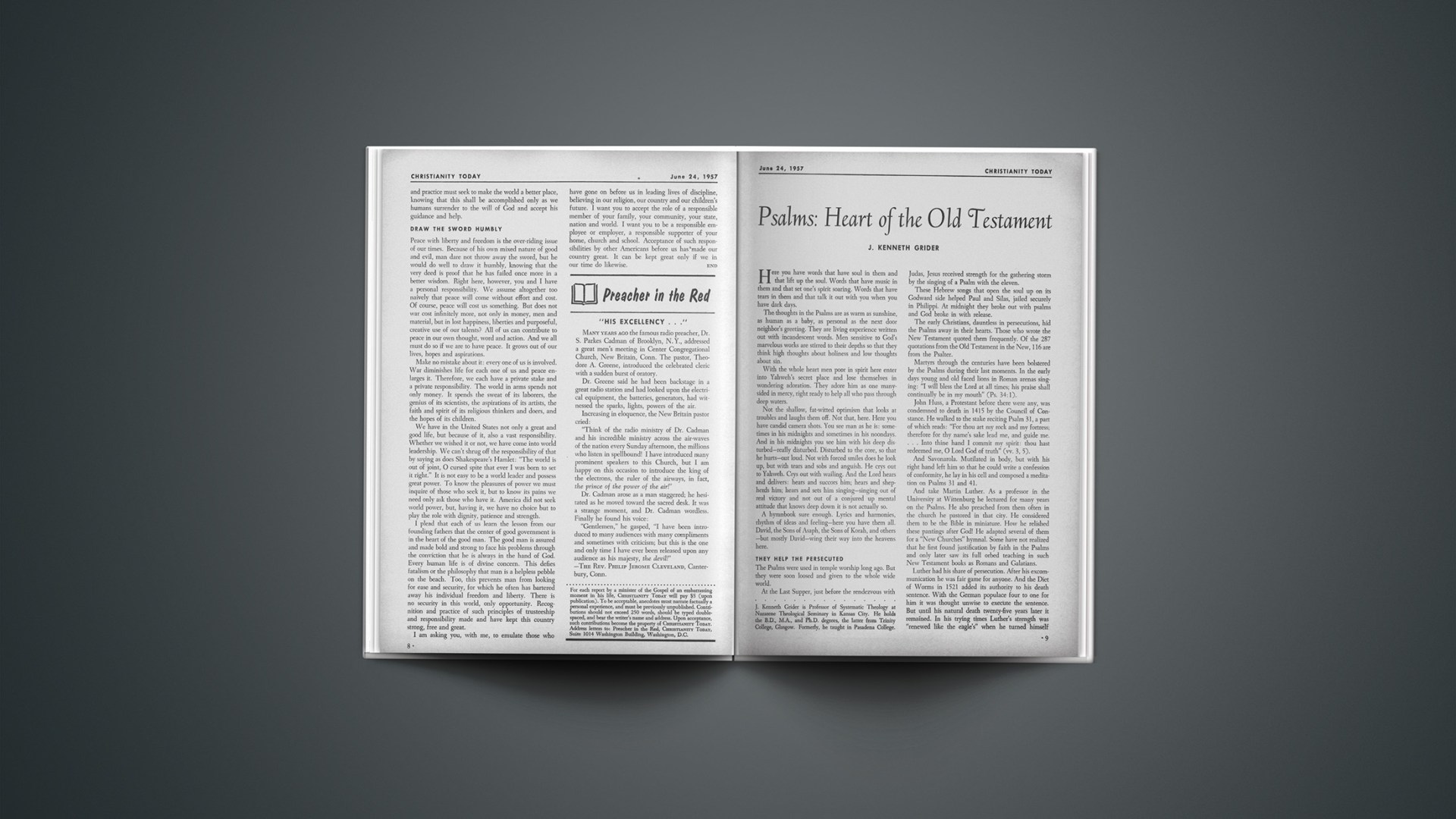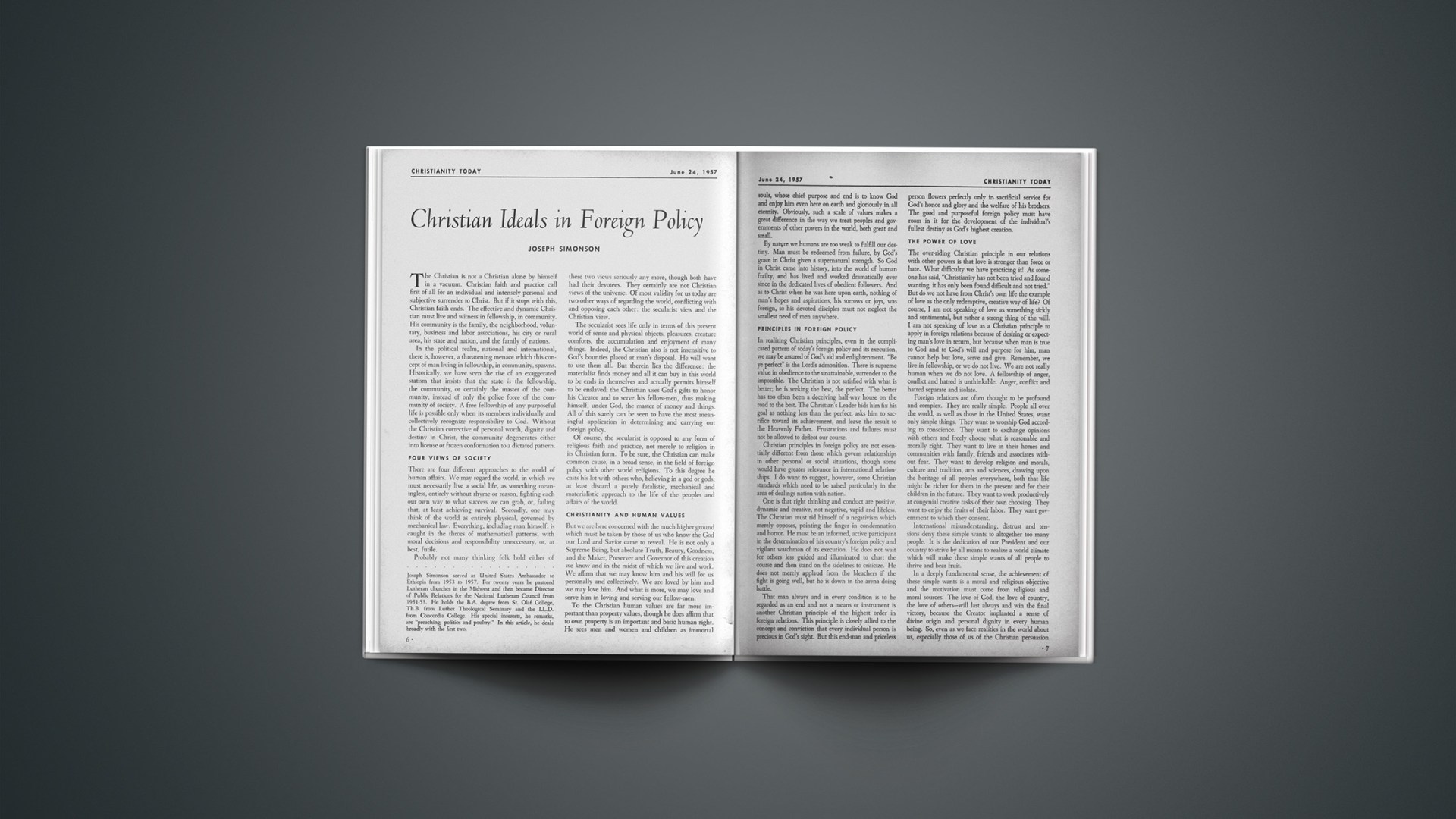“Like Wesley, I find that I must preach the law and judgment before I can preach grace and love.”
In line with his statement, Dr. Billy Graham devoted practically all of the first two weeks of the New York Crusade at Madison Square Garden to a series of sermons on the Ten Commandments.
“The Ten Commandments,” Dr. Graham said, “are the moral laws of God for the conduct of people. Some think they have been revoked. That is not true. Christ taught the law. They are still in effect today. God has not changed. People have changed.”
He continued:
“Every person who ever lived, with the exception of Jesus Christ, has broken the Ten Commandments. Sin is a transgression of the law. The Bible says all have sinned and come short of the glory of God. The Ten Commandments are a mirror to show us how far short we fall in meeting God’s standards. And the mirror of our shortcomings drives us to the cross, where Christ paid the debt for sin. Forgiveness is found at the cross, and no other place, according to the Bible.”
Each night Dr. Graham discussed a particular commandment. Some of his comment was as follows:
“God says, ‘thou shalt have no other gods before me.’ You may not have any idols set up in your back yard, but there are idols in your life. Anything that comes before God is your idol. You spend more time reading the newspaper than you do reading the Bible. You spend more time in front of the television set than you spend in church. Idols have crowded God out of your life. You just don’t have time for him any more.
“Another commandment says ‘thou shalt not take the name of the Lord thy God in vain, for the Lord will not hold him guiltless that taketh his name in vain.’ You may not curse God, but you take his name in vain when you profess to be a Christian and don’t live like one. You take his name in vain when you defile your bodies, when you make vows and don’t keep them, when you pray and don’t believe God.
“The Bible says ‘honor thy father and thy mother.’ Young people today think this is old fashioned. God doesn’t think it is old fashioned. He commands that such respect be given.
“The Scriptures say ‘thou shalt not kill.’ You may not have broken this commandment with a gun or a knife, but you have broken it. If you have ever had hate in your heart, you are guilty. You can murder your own souls by denying or neglecting God. You can murder others by setting a bad example.
“A commandment says ‘thou shalt not commit adultery.’ You may not have committed the act, but the Bible says if you have ever looked on a person with lust in your heart you are just as guilty. A woman commits this sin when she deliberately dresses in such a way as to entice a man. Preachers have been silent for too long on the subject. America can be destroyed quicker by moral deterioration than by communism.
“The Bible says ‘thou shalt not steal.’ It isn’t necessary to use a gun in order to break this commandment. We rob God in tithes and offerings, in our daily devotions and in not observing the Lord’s Day as we should.
“God also says ‘thou shalt not bear false witness against thy neighbor.’ The disgrace of the Christian church today is that we don’t have love one for another. May God have mercy on the secular magazines that will murder a man’s reputation in order to print a sensational story. May God have mercy on the leaders of some Christian periodicals, who spend all of their time trying to expose other Christians.”
He added:
“All have broken these commandments. All have sinned, and death is the penalty, but Christ paid the debt when he died on the cross. If you will come to the cross, confess and renounce your sins, receive by faith the Lord Jesus and surrender your will to him, he will forgive and forget. You will become a new person in Christ. Then you begin to grow as a Christian when you read your Bible, spend time in prayer, witness and become active in your church.”
The response to such a presentation at Madison Square Garden is testimony to its effectiveness. In three weeks an estimated 15,000 persons left their seats to make decisions for Christ.
In another phase of the Crusade, the Rev. Tom Allan of Glasgow, Scotland, challenged ministers of the metropolitan area during a series of addresses.
Mr. Allan, leader of the “Tell Scotland Movement” and a man who built two small congregations into big ones within a short time, stated:
“The churches never will win young people by meeting them on the level of entertainment or recreation. This generation’s youth will have to be won on the serious level of sacrifice. They will give up certain things and will undertake difficult tasks if we ask them.
“Give people definite tasks and they will respond. This is particularly true of youth. In times of emergency young people come through with magnificent response. This was proved in the Battle of Britain. Today our young people are responding to the tremendous adventure the church can offer.
“What we are fighting against is partly the aftermath of world wars’ disillusion, the collapse of old conditions that people had supposed would last forever. Now there’s hunger for something real. We are living in a one-dimension world, a world of vast and unprecedented breadth but little or no height, a world where the divine dimension is no longer a reality. We want to bring back that dimension.
“What I have to tell the ministers here about what we are doing in Glasgow comes from a profound realization that we have barely touched the edges of what needs to be done. I believe that here and in Scotland and other parts of the world a spiritual revolution is on the way.
“People want it.”
Crusade Quotes
“The biggest disgrace in the Christian Church today in America is that we don’t love one another. Some professing Christians spend all their time trying to expose other Christians. The Bible says such people may be important in their own eyes, but to God they are tinkling cymbals.”—Billy Graham.
“Before the Crusade began I knew but one neighbor in our large building. Even though self-conscious about it, I went to each apartment and invited people to the meetings. Already three whole families have come to Christ. Our building isn’t the same.”—Testimony of an Apartment house “cliff dweller.”
“Billy Graham’s Crusade apparently has clicked. Midtown bookstores report the biggest demands for the Bible in years.”—Walter Winchell.
Cross Of Christ
Excerpts front baccalaureate sermon delivered at Roanoke College, Salem, Va., by Dr. William C. Robinson, Professor of Historical Theology at Columbia Theological Seminary, Decatur, Ga.:
“The gospel is like a trumpet, ‘more powerful and penetrating when it does not follow the range of the scale but keeps to one penetrating note.’
“It is not a philosophy proved by the persuasive words of man’s wisdom, but a message from God to be attested and accepted … the good news of God’s great acts for our redemption needs … anything else is to empty the Cross of Christ of its power.
“Luther is sure that one does not need to shout or cry aloud in his preaching, for the power of the gospel is not in the lungs of a man but in the might of the Spirit.…
“The problems of life today are too great to be faced in the strength of puny man. God gives us power to meet the issues of life only when we stand upon the foundation he has laid. May we not turn from his testimony to the nostrums of men. Why should one forsake the fountains of living water for man-made cisterns which hold no true water? When we start with Christ as the foundation, the absolute, the subject, there are blessings for each issue in life. But when one takes up every popular project that culture offers, when he treats some great cause as God’s new Messiah before he relativizes Jesus Christ, everything is thrown out of order.
“Some have taken total abstinence, others pacifism, others economic collectivism, others racialism as their primary interest and treated Jesus Christ as secondary. Thus, one man decides that all use of force is wrong, and that if Jesus struck anyone with the whip of cords in cleansing the Temple, he will have nothing to do with Jesus. Another starts with current studies on the evils of alcoholism and concludes that Jesus was wrong in turning the water into wine. Then he undertakes to excuse Christ on the ground of some kind of kenotic theory. Jesus Christ is the Lord, the subject one who declines to be made the predicate for any human scheme.…
“The Christian Church has no commission to reverse the process. Take God’s way and his Spirit blesses it. Try to reverse God’s way and the Church becomes no longer the ambassador of God.… The ambassador of the living God preaches the LORDSHIP of Jesus Christ, the crucified.”
People: Words And Events
BUSY FATHER—A 73-year-old retired school teacher who has taught 5,000 students, reared four children and now works as a school-crossing patrolman and as a tutor for high school youngsters, has been named Texas Baptist Father of the Year. He is Ira Irving Isbell, a member of the Polytechnic Baptist Church, Fort Worth.
INVITATION DECLINED—Dr. Karl Barth, Swiss Protestant theologian, declined an invitation from the Warsaw Radio to broadcast his views on the possibility of an international agreement to ban nuclear weapons tests as the first step toward outlawing all weapons of mass destruction. “We are awaiting deeds, not discussions,” Dr. Barth replied. “Sincere and worthy of belief … will be that world power which, regardless of the attitude of the opposing side, will be the first to announce its firm renunciation of further nuclear weapons tests.”
NOBLE EXPERIMENT—In lieu of coffee breaks, more than 50 health department employees in Pueblo, Colo., have elected to hold twice-monthly 30-minute discussions with clerygmen of the different churches. The ministers will give a short presentation and then discuss with employees various problems affecting them or the community.
VALUABLE ESTATE —The Rev. John Garlick Scott, retired Episcopal rector who died recently, left an estate valued at $850,000 to a charitable foundation he established last fall. The William H., John G. and Emma Scott Foundation was created for religious, charitable and philanthropic purposes. It has no denominational restrictions.
NONSENSE—Talk of one great “universal church” was branded as nonsensical by the Rev. Murdoch Macphail, newly-elected moderator of the General Assembly of the Free Church of Scotland. “Our existing ecclesiastical organization,” he said, “may not be the final form of the visible Church on earth but a mechanical arrangement as proposed seems to be quite as unnatural as a world government.… Much theological nonsense has been written and spoken by those who advocate a universal Church.”
NEW BISHOP—The Reformed Episcopal Church elected its first new bishop since 1920 at the 35th triennial meeting of its General Council in Chicago. He is Dr. Henry Harris Trotter, 59, rector of St. Paul’s Reformed Episcopal Church, Oreland, Pa.
WAGING OPEN WAR—Dr. Geoffrey Francis Fisher, Archbishop of Canterbury, has accused the Roman Catholic Church in Britain of waging an “open war” against the Church of England, “unlike its friendly counterpart on the Continent.” The Roman Catholics are waging an intensive campaign in Britain for new members.
APOLOGY DEMANDED—Pastors from 150 Southern California Disciples of Christ churches have demanded an apology from the Marine Corps for “irresponsible” statements “concerning some of our great religious leaders” made during the recent court martial of a marine private at Camp Pendleton. The private refused to accept a rifle after deciding he was a conscientious objector. Several Methodist clergymen, including Bishop Gerald H. Kennedy of Los Angeles, testified in his defense. During the trial Bishop Kennedy was called a “creep” by one member of the court martial, who was subsequently ousted for his off-duty comment. Another clergyman, the Rev. Eugene Wood of Oceanside, Calif., was forced to answer prosecution questions seeking to link Methodist agencies with communism.
EXCHANGE OF VIEWS—Georgia Presbyterian leaders called upon judicial and law enforcement agencies to stick to their business of rounding up and punishing law violators and to refrain from telling churches what they shall “preach or teach.” This was in reply to a presentment handed down by the DeKalp County Grand Jury which said, in effect, that preachers should pay more attention to preventing juvenile delinquency instead of “advocating race mixing.”
Southern Baptists
Dr. William A. Mueller, professor of systematic theology, Southern Baptist Theological Seminary, Louisville, Ky., is the writer of the following special report on the recent annual meeting of Southern Baptists in Chicago:
More than 8,500 messengers and 5,000 visitors, representing nearly 9,000,000 Southern Baptists—the nation’s fastest growing major denomination—recorded many significant developments at the recent Convention in Chicago’s amphitheater.
President C. C. Warren insisted in his opening address that “it is not the policy of Southern Baptists to go as invaders anywhere. We prefer to be regarded as allies, but where there are large numbers of unsaved and unchurched people, we feel compelled to go to the limit of our ability in getting the message of salvation to them.”
Dr. Baker James Cauthen, Executive Secretary of the Foreign Mission Board, reported steady progress with regard to the world-wide expansion of Southern Baptist missionary work. Prior to 1948 Southern Baptists labored in Argentina, Brazil, Chile, China, Colombia, Ghana (Gold Coast), Hawaii, Hungary, Israel, Italy, Japan, Macao, Manchuria, Mexico, Nigeria, Paraguay, Roumania, Spain, Uruguay and Yugoslavia. Since January 1, 1948, when the Advance Program was launched, new mission posts have been opened in the Bahamas, Costa Rica, Ecuador, Egypt, Formosa, Guatemala, Honduras, Hong Kong, Indonesia, Jordan, Kenya, Korea, Lebanon, Malaya, Pakistan, Peru, Philippines, Southern Rhodesia, Switzerland, Tanganyika, Thailand and Venezuela. Southern Baptists are presently working in 38 countries and territories. Their total missionary personnel on the foreign field is 1,113 and within the next five years it will reach 1,800.
While the 30,834 churches of the SBC gave $372,136,675 to all causes, their contribution to foreign missions amounted to $12,474,638, or $1.43 per member.
During 1956 the largest number of missionaries were appointed—121. In the decade between 1938–47 an average of 36 new missionaries were appointed, while from 1948–56, the first nine years of advance, an average of 85 people were sent to the field.
By 1964 Southern Baptists aim to establish 30,000 new churches. This goal has been set by the executive committee and the affiliated agencies of the Convention in order to celebrate the 150th anniversary of the establishment of United Baptist missions in 1814.
Among the high peaks of the Convention’s sessions was the brief address by Howard Butt of Texas on the Billy Graham Crusade in New York City. The messengers eagerly heard this speaker as he dramatically told of the wonders of God’s grace in the vast metropolis. Fraternal greetings were sent to Dr. Billy Graham, assuring him and his associates of the prayers of his fellow-Southern Baptists.
One of the most significant decisions made by Southern Baptists was the establishment of a new theological seminary in Kansas City, Missouri. Although Denver and Chicago were eloquently recommended as possible sites for a new seminary, the advocates of Kansas City won out. That city, it was argued, is well situated with regard to the five other seminaries. It is practically equi distant from Louisville’s Southern Seminary and Southwestern Seminary in Fort Worth, Texas, the two schools with the heaviest enrollment. In the four states of Missouri, Arkansas, Illinois, and Oklahoma, Southern Baptists have 4,800 churches with 1,230,000 members who in 1956 gave a total of $40,000,000 to all Southern Baptist causes. There are 400 pre-ministerial students in the Southern Baptist colleges in Missouri alone, not to speak of more than three times that number in the other states of this area. The Convention voted $2,000,000 as the initial outlay for the new seminary.
The Christian Life Commission, headed by Congressman Brooks Hays, vigorously protested against continuing mistreatment of Negroes by segregationists and called on law-enforcing agencies to “bring to legal justice the perpetrators of these crimes.” Dr. Henley Barnette, Dean of Southern Baptist Seminary, spoke on behalf of the acceptance of the committee’s report. There was no time for discussion and, according to some observers, the presiding officer put the question without waiting for a second. On the last day of the Convention, 84 year old Dr. W. M. Nevins of Kentucky rose to attack the committee’s report and expressed resentment over the insinuation that “the philosophy of equal but separate treatment of Negroes” is labeled unchristian. His protest went unheard by the messengers of the Convention.
Southern Baptists often are best understood by what they vote down at their conventions. Thus, the proposal to enlarge the facilities of Ridgecrest and Glorietta assemblies so as to provide for a permanent meeting place of the Southern Baptist Convention was voted down. The cost of such a venture was thought to be prohibitive. Yet, the cost of holding a Convention at a place like Chicago is enormous. Another proposal to change the name of Southern Baptists to World-Wide Baptists was voted down with equal vigor.
Although Southern Baptists are now working in 46 states, they seem to be unwilling to reckon with that fact when it comes to changing of their name. James M. Bulman, North Carolina, tried in vain to have the Constitution of the SBC changed so as to safeguard the interests of the local church Dr. J. D. Grey, New Orleans, and former president of the Convention, helped defeat Bulman’s proposal. He pointed out that the present Constitution amply provided for the rights and freedom of local churches affiliated with the Southern Baptist Convention.
Congressman Brooks Hays, Arkansas, was elected president of the SBC, being the first layman to head it in 12 years. Dr. W. Douglas Hudgins of Jackson, Miss., was elected first vice-president and Dr. Noel Taylor, Carbondale, Ill., second vice-president. Next year’s Convention sessions are to be held in Houston, Texas, with Dr. Robert E. Naylor of Fort Worth chosen as Convention preacher. The 1959 Southern Baptist Convention is to be held at Louisville, Ky., in connection with the centennial celebration of the establishment of Southern Baptist Theological Seminary.
Worth Quoting
Quotes from Southern Baptist Convention speakers:
“We must give the people of the earth the Lord Jesus Christ to give direction to the material and cultural benefits we are giving them, else they will turn on us some day to destroy us.”—The Rev. George W. Cummings, associate director, Chaplains Commission, Atlanta, Ga.
“The devil would rather start a church fuss than sell a barrel of liquor.”—Dr. W. Ross Edwards, pastor, Swope Park Baptist Church, Kansas City, Mo.
“Churches have been ringing church bells when they should have been ringing door bells.”—Dr. E. Hermond Westmoreland, pastor, South Main Baptist Church, Houston, Texas.
“In 1950 when Southern Baptists last met here, there were six small Southern Baptist Churches in metropolitan Chicago; now there are 56, and there are 1,000 Southern Baptist churches in the Great Lakes area, and increasing at the rate of one new church every four days.”—Dr. Noel M. Taylor, executive secretary of Illinois Southern Baptist Convention.
“There are evidences that the world is on the verge of the greatest religious awakening in history.”—Dr. C. C. Warren, pastor, First Baptist Church, Charlotte, N. C., and retiring president of SBC.
—F. D. W.
American Baptists
The following is a special report of the American Baptist Convention’s Golden Anniversary, observed recently in Philadelphia. It was written forCHRISTIANITY TODAYby Dr. Harold L. Pickett Jr., pastor of Tremont Temple Baptist Church, Boston, Mass.
Dr. Harry Dillin, president of Linfield College, McMinnville, Oregon, and the Convention, in his presidential address challenged the denomination to undertake two progressive steps.
First, to authorize the Home Mission Society to borrow $3,000,000 for the purpose of building new churches, and second, to raise $7,500,000 during the next three years for Baptist higher education.
This program was enthusiastically adopted, but there was much corridor conversation concerning which schools were to be recipients of the money. The criterion for determining this, as stated by the motion, will be cooperation on the part of the institution with the American Baptist Convention. Since the word “cooperation” sometimes implies rather nebulous concepts, the question naturally follows: What is meant by the term? The Board of Education and Publication has been charged with the responsibility of answering this question. The answer, in my opinion, will determine the degree of the success of the campaign.
The most vexing problem confronting the Convention was the location of its headquarters. For several years it has been the opinion of delegates that a site should be selected where all cooperating agencies can be housed together. The General Council recommended by a 17 to 14 vote that property should be selected within a 50-mile radius of Chicago for this purpose. After lengthy debate, characterized by Christian consideration, the recommendation was accepted by an 84 majority. Protagonists for the Chicago site, feeling this was too small a majority, moved that the matter be reconsidered and referred back to the General Council. The council was instructed to appoint a commission to study the problem and bring a definite recommendation to the 1958 Convention in Cincinnati.
Professor James Wesley Ingles of Eastern Baptist College wrote and produced an historical pageant-drama entitled “From These Roots.” The spectacular production told the story of some 250 years of Baptist history in the United States. Staging, costuming, acting and music, furnished by the Eastern Baptist College choir, were outstanding. Every scene exalted Christ as the Savior and Lord of mankind.
American Baptists, renowned the world over for their mission zeal, evidenced their continuing concern for others by appointing 32 new foreign missionaries and 31 to serve on the various home fields. The commissioning service was a personal challenge of rededication for all missionaries and delegates.
The greatest concern evidenced by the discerning delegates was that American Baptists are not growing numerically. In an open-forum session, Dr. Cecil Osborne, pastor of the First Baptist Church of Burlingame, California gave the results of a questionnaire sent out to a large number of American Baptist pastors. Five basic reasons were seen for the lack of growth.
They are:
We are not producing enough pastors in our seminaries. Only one-third of the American Baptist pastors are educated in our own schools. The remaining two-thirds come from Bible schools, other denominational seminaries or no schools at all.
We have a status-quo mentality on the part of our leaders and our pastors.
We’re not building enough new churches.
We do not have a real sense of destiny. Ecumenicity is fine as far as it goes, but it is a poor substitute for true purposefulness.
We are lacking in personal spiritual vitality. Organization alone will not produce the desired growth.
In the discussion that followed, it was also suggested that too often American Baptists are theologically ambiguous. Southern Baptists, who are growing rapidly, were held up as an example. Your reporter has the temerity to suggest there is another reason for the lack of growth. We have failed in many of the churches in our Convention to develop a Christ centered, biblically based, evangelistic program. Without this type of New Testament evangelism, growth is an impossibility.
Southern California delegates were pleased by the Convention’s full recognition of California Baptist Theological Seminary, located in Covina, California. Evangelicals of the Convention were greatly encouraged by this action. This institution will make a profound spiritual contribution to the life of the Denomination because of its positive stand for the true New Testament Christianity.
Delegates and visitors heard an address by Dr. Billy Graham. After reporting briefly on the New York Crusade, Dr. Graham spoke about the need for evangelism in all areas of life. He said each professor in church-related colleges, regardless of his field, should be primarily concerned about the winning of his students to Christ. He pointed out that Wheaton College, with this emphasis, is attracting students in such numbers that 9,000 applicants had to be turned away last year. He challenged American Baptists to insist on a Christ-centered evangelistic emphasis on every one of its college campuses.
Dr. Clarence Cranford, pastor of Calvary Baptist Church in Washington, D. C., was elected president of the Convention. An interesting note is that Congressman Brooks Hays, who belongs to the same church, was elected president of the Southern Baptist Convention recently at Chicago. In bringing greetings from Southern Baptists, Congressman Hays said, in effect, “The fact that Dr. Cranford and I belong to the same church is symbolic of the way in which the two conventions will work together next year.”
A Challenge
The world population is increasing at the rate of 83 persons a minute, or about 5,000 an hour, and at the present rate will double by the end of this century, according to the United Nations Demographic Yearbook for 1956.
The yearbook estimated the world population now at 2,777,000,000. It said the population increases by about 43,000,000 a year.

